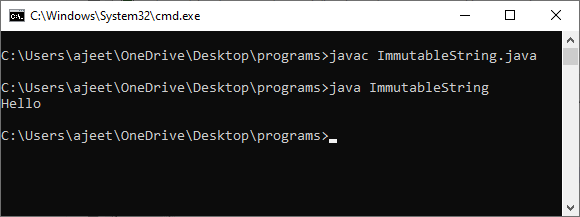Why Are Strings Immutable in Java? Secret Factors and Benefits Clarified
Why Are Strings Immutable in Java? Secret Factors and Benefits Clarified
Blog Article
What Is Unalterable Strings and How It Functions
In the realm of programs, comprehending the idea of immutable strings is extremely important for producing durable and protected applications. Immutable strings refer to strings that can not be changed after they are created, guaranteeing information integrity and predictability within the code. This essential concept plays an important function in numerous shows languages and provides an unique approach to taking care of information. By checking out the ins and outs of exactly how unalterable strings work, one can reveal a world of benefits and possibilities that can boost the top quality and performance of software advancement.
The Basics of Unalterable Strings
Immutable strings, as a fundamental concept in shows, are personality series that can not be altered when they are produced. This suggests that once a string is designated a value, that value can not be changed. In languages like Python and Java, strings are unalterable things, leading to different ramifications in regards to memory monitoring and data stability.
Among the key benefits of immutable strings is that they offer a sense of safety and security in information manipulation. Considering that the content of an unalterable string can not be customized, it makes certain that the original data stays undamaged, reducing the risk of unexpected changes throughout program execution (Why are strings immutable in Java?). This home likewise streamlines debugging processes, as designers can trust that once a string is defined, its value will certainly not be inadvertently altered
When a brand-new string is created based on an existing one, rather than customizing the initial string, the brand-new value is kept independently. In general, understanding the essentials of immutable strings is important for understanding shows principles and maximizing code effectiveness.
Benefits of Unalterable Strings
Structure upon the safety and effectiveness benefits of immutable strings, their advantages reach improving code reliability and streamlining simultaneous programming jobs. By being unalterable, strings can not be modified after production, which gets rid of the threat of unintentional adjustments in the information they store. This inherent immutability makes certain that once a string is developed, its value stays continuous throughout the program's execution, minimizing the opportunities of insects brought on by unexpected changes.
In addition, immutable strings contribute to code reliability by making it easier to reason regarding the state of a program. Considering that strings can not be transformed, developers can rely on that a string will certainly constantly hold the same worth, simplifying debugging and maintenance efforts. This predictability causes more trustworthy and secure codebases.

Implementation in Programs Languages
Within numerous programming languages, the incorporation of immutable strings is a basic aspect that influences exactly how data is dealt with and manipulated within code frameworks. The execution of immutable strings varies across various programming languages, with each language website here offering its very own mechanisms to support this concept.

On the other hand, languages like C and C++ do not have built-in support for immutable strings. Developers in these languages must manually implement immutability by enforcing policies within their code to stop straight alterations to string items.
Ideal Practices for Functioning With Unalterable Strings
When managing unalterable strings in programs languages like Java and Python, sticking to finest practices makes sure secure and efficient data control. One of the crucial finest methods is to utilize StringBuilder or StringBuffer rather than straight controling strings, especially when handling extensive concatenation operations. These courses supply mutable choices for string adjustment, aiding to avoid unneeded memory appropriations and boosting efficiency.
Another best practice is to use string interpolation or formatting works offered by the language rather than manual concatenation. This not only improves readability but also aids in protecting against typical pitfalls such as unintended string alterations. Furthermore, when dealing with sensitive information such as passwords or API secrets, it is crucial to prevent keeping them as ordinary text in immutable strings. Making use of safe and secure storage space mechanisms like char ranges or specialized libraries for managing delicate details helps minimize security dangers related to immutable strings.
Real-world Applications and Instances
Checking out practical executions of immutable strings in different sectors discloses their considerable influence on data honesty and system integrity. In the health care field, unalterable strings play a critical role in guaranteeing the protection and confidentiality of individual information. By preventing unapproved alterations to delicate info such as clinical records and prescriptions, immutable strings assist keep conformity with rigorous privacy policies like HIPAA.
Economic institutions also gain from the unalterable nature of strings to boost the protection of consumer data and deal records. Immutable strings assist stop fraudulence and unapproved modifications to monetary info, supplying a durable protection versus cyber risks and making sure the trust fund and confidence of customers.

Final Thought
Finest techniques for functioning with unalterable strings consist of avoiding direct modifications and making use of methods that return new string items. Real-world applications of immutable strings include data file encryption, caching, and string adjustment jobs.
Immutable strings refer to strings that can not be changed after they are developed, making sure information integrity and predictability within the code. When a brand-new string is produced based on an existing one, instead than modifying the initial string, the brand-new worth is saved independently.In languages like Java and Python, strings are unalterable by default, meaning that as soon as a string object is produced, its value can not be changed - Why are strings immutable in Java?. Finest methods for functioning with unalterable strings consist of staying clear of direct adjustments and making use of methods that return new string items. Real-world applications of immutable strings include information encryption, caching, and string manipulation tasks
Report this page